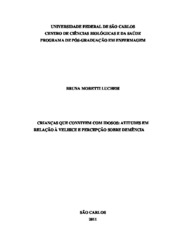Crianças que convivem com idosos: atitudes em relação à velhice e percepção sobre demência
Abstract
The increase in the number of elderly in the population and increased longevity create greater opportunities for interaction with children of this overall population. Since the beginning of life children develop attitudes toward aging and older people with whom they live. The perception that progressively build is based on these relationships and are influenced by several factors. Objectived to assess the attitude toward aging of children living with elderly people with and without cognitive impairment and check on the perception of the same dementia / Alzheimer disease (AD). The study was based on the method of quantitative and qualitative research and ethical guidelines were followed. Was interviewed 54 children from 7 to 10 years of age were enrolled in five different Units of Family Health of a city of State of São Paulo who were living with at least one elderly person. The children were interviewed, was applied a questionnaire of characterization, Scale of Attitudes Toward Aging for Children and issues related to aging and dementia / AD. In the elderly living with children (n = 46) was made the characterization and applied the Mini-Mental State Examination (MMSE). Quantitative data were statistically analyzed and the qualitatives by thematic analysis. Most children were male, had nine years, was in 4° grade of Elementary School and was the granddaughter of the elderly with whom she lived. The average of child in the attitude scale was 1.59 points, one point represents the most positive attitude possible and three points more negative. The elderly were mostly female, between 60 and 64 years and mean MMSE score of 20.4 points. Most children (53.7%) live with elderly people without cognitive impairment. Significant differences was found in the areas of cognition and social relationship of the attitude scale when was compared groups of children living with elderly people with and without cognitive impairment, being that those who live with elderly with cognitive impairment have more negative attitudes in these areas. Regarding the open issues, changes in physical appearance and way of thinking have been highlighted as inherent to aging. They also emphasized the memory loss of elderly patients with whom the child lives. The vast majority of children had no knowledge about dementia/AD. Health professionals in basic attention should be attentive to multigenerational families, and within the Family Health Program to invest in strategies for gerontological education.
